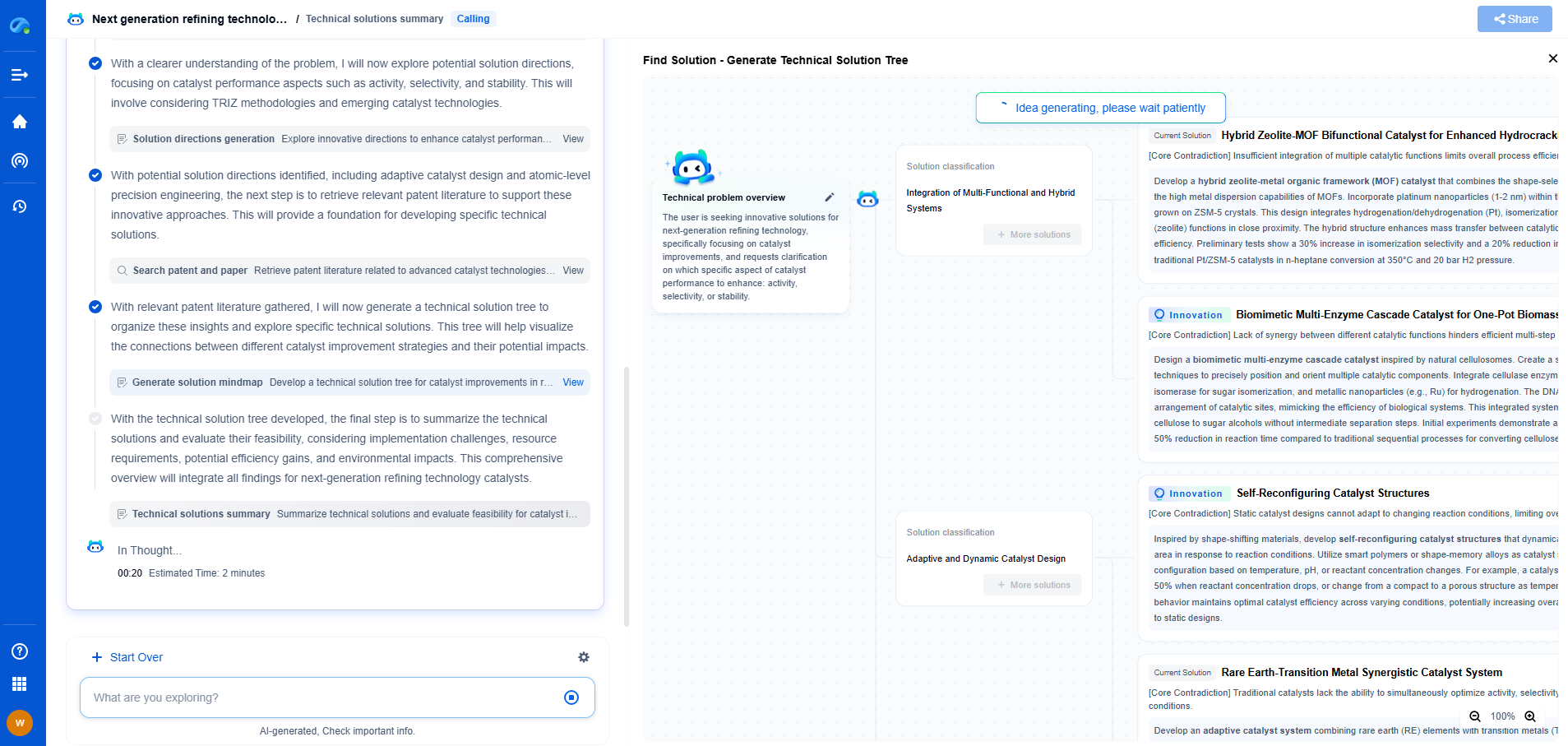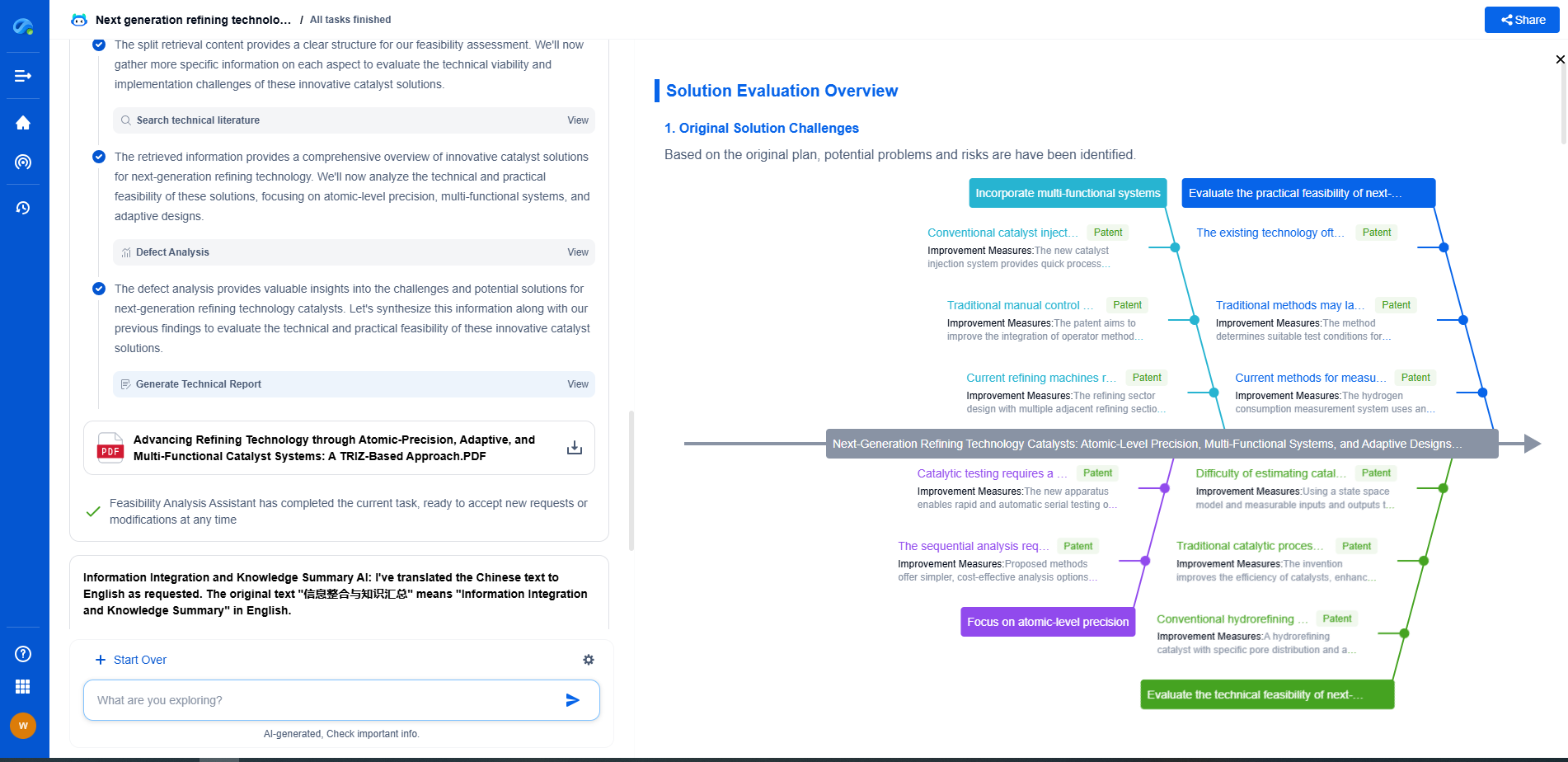What is Process Control? Automation in Chemical & Oil/Gas Industries
JUL 2, 2025 |
Process control is a critical element in the chemical and oil/gas industries, allowing for the efficient and safe operation of complex industrial processes. At its core, process control involves managing and regulating the conditions within which industrial processes take place. This includes maintaining parameters such as pressure, temperature, flow rate, and chemical composition within desired ranges to ensure the desired product quality and operational efficiency.
Key Components of Process Control Systems
Process control systems typically consist of several components that work together seamlessly. These include sensors, controllers, and actuators. Sensors are used to measure various process variables such as temperature and pressure. Controllers receive data from sensors and compare it with setpoints to determine the necessary adjustments. Actuators, such as valves and pumps, then adjust the process variables to maintain them within the desired range.
Types of Process Control
In the realm of process control, there are several types typically employed, including feedback control, feedforward control, and advanced process control (APC). Feedback control is the most common, where the system adjusts based on deviations from a setpoint. Feedforward control anticipates disturbances by adjusting inputs in advance. APC uses more sophisticated techniques like model predictive control to optimize control strategies and improve efficiency.
Automation in the Chemical Industry
The chemical industry relies heavily on process automation to enhance productivity and ensure safety. Automation enables real-time monitoring and control of chemical reactions, optimizing the use of raw materials and energy. This not only reduces operational costs but also enhances product quality and consistency. Furthermore, automation systems can quickly respond to changes in process conditions, minimizing the risk of hazardous incidents.
Automation in the Oil and Gas Industry
In the oil and gas sector, automation plays a vital role in exploration, production, and refining operations. Automated systems help manage complex drilling processes, optimize resource extraction, and ensure the efficient operation of refineries. By integrating data from various sources, automation systems provide operators with real-time insights, enabling them to make informed decisions and maintain operational efficiency.
Challenges and Solutions in Process Control Automation
Despite its advantages, process control automation presents several challenges, particularly in terms of integration and cybersecurity. Integrating new automation technologies with existing systems can be complex and costly. However, adopting open standards and investing in training can ease this transition. Additionally, as automation systems become more interconnected, they are increasingly vulnerable to cyber threats. Implementing robust cybersecurity measures is essential to protect these critical infrastructures.
The Future of Process Control and Automation
Looking ahead, the future of process control and automation in the chemical and oil/gas industries is promising. Advances in artificial intelligence and machine learning are set to revolutionize these sectors, offering predictive analytics and enhanced decision-making capabilities. Furthermore, the integration of the Industrial Internet of Things (IIoT) will facilitate greater connectivity and real-time data analysis, driving further efficiencies and innovations.
Conclusion
Process control and automation are indispensable in the chemical and oil/gas industries, providing the means to optimize operations, enhance safety, and improve product quality. As technology continues to evolve, these industries stand to benefit from greater efficiency and innovation, paving the way for a more sustainable and productive future. Embracing these advancements will be crucial for companies seeking to maintain a competitive edge in an increasingly dynamic and complex global market.
Ready to Reinvent How You Work on Control Systems?
Designing, analyzing, and optimizing control systems involves complex decision-making, from selecting the right sensor configurations to ensuring robust fault tolerance and interoperability. If you’re spending countless hours digging through documentation, standards, patents, or simulation results — it's time for a smarter way to work.
Patsnap Eureka is your intelligent AI Agent, purpose-built for R&D and IP professionals in high-tech industries. Whether you're developing next-gen motion controllers, debugging signal integrity issues, or navigating complex regulatory and patent landscapes in industrial automation, Eureka helps you cut through technical noise and surface the insights that matter—faster.
👉 Experience Patsnap Eureka today — Power up your Control Systems innovation with AI intelligence built for engineers and IP minds.
- R&D
- Intellectual Property
- Life Sciences
- Materials
- Tech Scout
- Unparalleled Data Quality
- Higher Quality Content
- 60% Fewer Hallucinations
Browse by: Latest US Patents, China's latest patents, Technical Efficacy Thesaurus, Application Domain, Technology Topic, Popular Technical Reports.
© 2025 PatSnap. All rights reserved.Legal|Privacy policy|Modern Slavery Act Transparency Statement|Sitemap|About US| Contact US: help@patsnap.com

